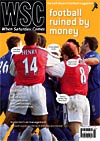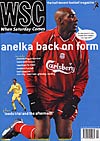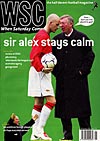 Dear WSC
Dear WSC
Neil Reynolds (WSC 180) thinks it inconceivable that Lee Hughes should choose to leave West Brom for Coventry for footballing reasons, but I think he should consider the facts at the time that decision was made rather than the current league table.
When Hughes signed for Coventry we were rated as second favourites by most bookmakers to be promoted back to the Premiership. Just about every pundit considered us to be more likely to get promotion than the Baggies and at the point of Hughes’s signature the full extent of Coventry’s debts had not yet been made public. These are the footballing reasons. We were considered to have a better team than West Brom. The fact that West Brom have a bigger stadium and higher attendances are not footballing reasons. The fact is that Hughes would have felt that he was more likely to get promotion with Coventry than with Albion.The real gist of this is that fans of some of the other Midlands clubs cannot accept the fact that Coventry have been a more successful club for the last 15-20 years and that this may be the reason we have been able to lure their players away (Birmingham – Liam Daish and Gary Breen; Wolves – Steve Froggatt; Baggies – Hughes) so they choose to believe that the players can only have been influenced by financial considerations. To borrow Neil Reynolds’s warthog analogy, that doesn’t wash either.
Ian Hossack, via email
Search: ' Euro 68'
Stories
 Tuesday 1 Plenty of encouragement for Man Utd as would-be contenders Liverpool draw 1-1 (“You always feel with Bolton you need the extra goal,” says Phil Thompson) and Chelsea collapse 4-2 at home to Southampton. “It is very strange,” says Claudio Ranieri, rubbing his chin as though he had discovered a new phenomenon. Leeds stay top after disposing of West Ham 3-0. Newly buoyant Ipswich spring a leak, losing 3-2 at Charlton after Marcus Bent scores twice in the first five minutes. “You always remain optimistic,” says Walter Smith unconvincingly after Everton’s fifth defeat in a row, 1-0 at Middlesbrough. Nicky Law leaves Chesterfield to take over at Bradford City.
Tuesday 1 Plenty of encouragement for Man Utd as would-be contenders Liverpool draw 1-1 (“You always feel with Bolton you need the extra goal,” says Phil Thompson) and Chelsea collapse 4-2 at home to Southampton. “It is very strange,” says Claudio Ranieri, rubbing his chin as though he had discovered a new phenomenon. Leeds stay top after disposing of West Ham 3-0. Newly buoyant Ipswich spring a leak, losing 3-2 at Charlton after Marcus Bent scores twice in the first five minutes. “You always remain optimistic,” says Walter Smith unconvincingly after Everton’s fifth defeat in a row, 1-0 at Middlesbrough. Nicky Law leaves Chesterfield to take over at Bradford City.
 Steve Parish remembers Manchester City’s 1967-68 season
Steve Parish remembers Manchester City’s 1967-68 season
Nineteen sixty-eight was my last year at school. A-level revision had to be fitted in around the end to Manchester City’s best postwar season, when they played ten matches in six weeks. The run-in began with an amazing night at Old Trafford when George Best scored first but City cruised into top gear and beat title rivals United 3-1. I’ve still got the little reel-to-reel tape, recorded off the radio, of a Radio 4 documentary called More Than A Game, with vox pop interviews before, during and after the match, and roars, singing and cheers throughout.
 Did football really have a golden age? A new photo collection seems unsure when it was, says Doug Cheeseman, though it definitely took place in London
Did football really have a golden age? A new photo collection seems unsure when it was, says Doug Cheeseman, though it definitely took place in London
This is a giant airbrick of a football photobook, comprised of black and white documentary pictures from the start of the 20th century to 1985. The notional theme of the book is football in its broader social context, in the period before commercialism took over and photographers swapped their black and white films for colour. In other words, football in all its sepia, if sometimes rose-tinted, glory.
 Joyce Woolridge wades through yet another book allegedly written by George Best and finds it more honest than the previous ones, but no less depressing
Joyce Woolridge wades through yet another book allegedly written by George Best and finds it more honest than the previous ones, but no less depressing
Blessed is George Best’s fourth autobiography. He has also been the subject of at least two other major biographies and a film. Aside from Billy Wright, he is probably the most prolific producer of various versions of his life story. Potential readers of what might be Best’s last book, given his increasingly fragile health, might ask if there is anything else to be said about his brilliant football career and spectacular fall from grace. Blessed, though full of much familiar material, is sufficiently different from what has gone before to be of interest.